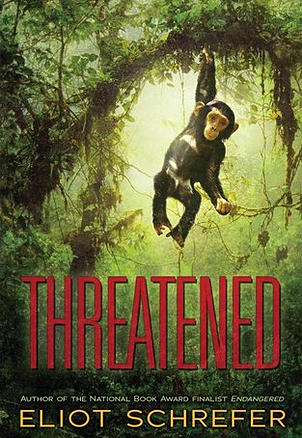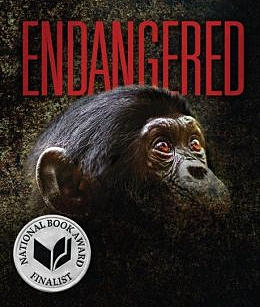I had the opportunity to meet and speak with author Eliot Schrefer at the Red Hook Book Festival. His book, Endangered, was a National Book Award Finalist for Young People's Literature. It also garnered a starred review in Publishers Weekly and praise from Kirkus, ALA, NPR and a host of others. All well-deserved!
Endangered is a compelling
story set in war-torn Congo. Please share with us your experiences researching
this story in such a dangerous place?
First, I want to say thanks
for having me! It’s a treat to visit your blog. To answer your question, I
traveled to a sanctuary for orphaned bonobos, called Lola ya Bonobo (“Bonobo
Paradise” in the local language, Lingala), in order to research the book.
Though I was visiting Congo, I think of it as “Congo Lite.” They picked me up
from the airport, I stayed on the sanctuary grounds for two weeks, and then
they drove me back. It’s a beautiful, well-run place. Each morning I would
spend time with the orphans, then I would write in the afternoons. It was great
to be able to spend extended time with them—what changed most during my
research were the physical details, what bonobos feel like or even smell like.
What inspired you to write about bonobos?
A pair of pants! I bought a pair of Bonobos brand khakis, and thought it was a nonsense word. Then I looked them up and learned about this fourth great ape that I’d never heard about before. Once I knew their connection to us (98.7% DNA overlap) and their plight (struggling to survive in central Congo) I realized there was enough thematic information to write a novel.
You’ve managed to weave in so much information about the science of bonobos and their status in this novel without any “information dumps”. What challenges did you experience in doing this?
What inspired you to write about bonobos?
A pair of pants! I bought a pair of Bonobos brand khakis, and thought it was a nonsense word. Then I looked them up and learned about this fourth great ape that I’d never heard about before. Once I knew their connection to us (98.7% DNA overlap) and their plight (struggling to survive in central Congo) I realized there was enough thematic information to write a novel.
You’ve managed to weave in so much information about the science of bonobos and their status in this novel without any “information dumps”. What challenges did you experience in doing this?
I always hate in a movie
when the main character happens to walk by a college lecture hall, and pauses
for a minute to hear whatever the academic is lecturing about—which is, of
course, always germane to the movie’s events. Books have a little more leeway,
I think, because there’s a chance to hear a character’s internal thoughts. But
all the same, as you say, info dumps are a real problem. Most of the research
that I was able to work into the book was about their physical lives—how they
nest, how they fight, the texture of their hair, etc.—because those were things
Sophie was observing, herself. I tried to minimize times where I’d go “Sophie
remembered reading that...”. All the same, I think readers love feeling like
their gaining new information. It just has to be presented inconspicuously.
Your next book, Threatened, focuses on another primate. Can you share the differences you encountered with your research on this book?
Your next book, Threatened, focuses on another primate. Can you share the differences you encountered with your research on this book?
Threatened is about
chimpanzees, and anyone who’s read Endangered knows they come off as villains
there. But what helped me come around to them immensely were the memoirs of
Jane Goodall. She writes about generations of the Gombe chimps she studied in
Tanzania, and their stories are totally gripping. Her writing really encouraged
me to look at chimp behavior as family stories above all. One chimp’s welfare
has everything to do with how it was raised.
 |
| *Starred reviews from both Kirkus and Publisher's Weekly |
What’s next for your readers?
I’m sure readers will be interested in learning more about the plight of these extraordinary primates. Can you point them to any organizations for more information?
Absolutely. There are two main organizations that work on bonobo welfare. One is Friends of Bonobos (www.friendsofbonobos.org <http://www.friendsofbonobos.org> ), which helps run the sanctuary where I stayed in Congo. Another is the Bonobo Conservation Initiative (www.bonobo.org <http://www.bonobo.org> ), which works on keeping the wild bonobos alive and well. Both very worthy organizations.
Thanks again for having me, Nancy!
It's been a pleasure, Eliot! For more information about Eliot and his books check out his website.



I want to share this wonderful testimony to the Good people all over the world on how I was able to Enlarge my Penis by Dr. zubby. I was living a shameful life from my young age, just last month as I was browsing on the internet about Penis size and Enlargement Products, I saw a testimony of a Man called George , testifying of how he was able to get his penis Enlarged by Dr. zubby and I decided to also Email Dr.zubby for my small penis size and he quickly respond to me and gave me the normal instructions which i did and then he shipped the product to me here in the united state which i received in just 3 working days and today i am very happy because i started seeing positive changes in my penis size in just 7 days of use. Dr zubby herbal product is the best recommended for you and to whom ever suffering from this shame or having any other diseases as well should Contact this great herbal doctor via his Email : dr.zubbysolutionhome@gmail.com and WhatsApp Him on +2348070673249
ReplyDelete